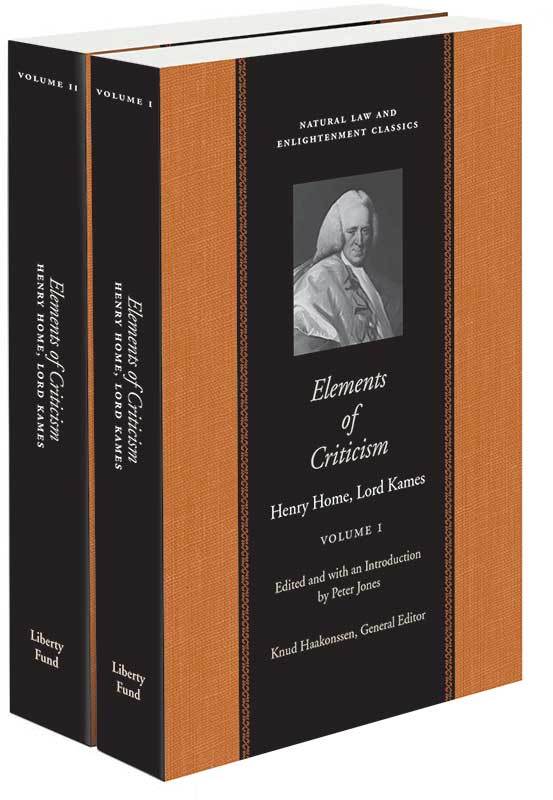Natural Law and Enlightenment Classics
-
Commentary on the Law of Prize and Booty
by Hugo Grotius
/ Learn MoreThis Liberty Fund edition of Commentary on the Law of Prize and Booty is based on the one prepared by Gwladys L. Williams and Walter H. Zeydel for the Carnegie Endowment for International Peace. It combines the original text and new material. Hugo Grotius (1583–1645) was a lawyer and legal theorist, diplomat and political philosopher, ecumenical activist and theologian. Martine…
-
The Constitution of England
by Jean Louis De Lolme
/ Learn MoreIn the vein of Charles Louis Montesquieu’s Spirit of the Laws (1748) and William Blackstone’s Commentaries on the Laws of England (1765–1769), De Lolme’s account of the English system of government exercised an extensive influence on political debate in Britain, on constitutional design in the United States during the Founding era, and on the growth of liberal political thought throughout…
-
Correspondence and Occasional Writings
by Francis Hutcheson
/ Learn MoreFrancis Hutcheson (1694–1746) was one of the most influential figures in the Scottish Enlightenment. Correspondence and Occasional Writings makes unknown and little-known writings available in a modern edition. It collects his private correspondence for the first time, as well as letters and occasional writings published from journals in England, Ireland, and the Netherlands. Hutcheson’s private correspondence contains many reflections on his own writings,…
-
The Divine Feudal Law: Or, Covenants with Mankind, Represented
by Samuel Pufendorf
/ Learn MoreThe Divine Feudal Law sets forth Pufendorf’s basis for the reunion of the Lutheran and Calvinist confessions. This attempt to seek a “conciliation” between the confessions complements the concept of toleration discussed in Of the Nature and Qualification of Religion in Reference to Civil Society. Samuel Pufendorf (1632–1694) taught natural law and was court historian in both Germany and Sweden.
-
Education for Life
by George Turnbull
/ Learn MoreGeorge Turnbull belongs with a group of early Scottish Enlightenment thinkers, including Francis Hutcheson, who found their native Calvinism too repressive. They sought to relocate religion within a context of reason and science and to establish a tolerant and humane ethic upon values rooted in classical ideals. In a distinctive voice, Turnbull presented natural-law theory “scientifically,” harnessed the arts to…
-
An Elegant and Learned Discourse of the Light of Nature
by Nathaniel Culverwell
/ Learn MoreAn Elegant and Learned Discourse of the Light of Nature is a concerted effort at intellectual mediation in the deep religious dispute of the English civil war in the seventeenth century. On one side was the antinomian assertion of extreme Calvinists that the elect were redeemed by God’s free grace and thereby free from ordinary moral obligations. Opposite to that…
-
Elements of Criticism
by Henry Home, Lord Kames
/ Learn MoreElements of Criticism is Kames’s most influential work. When it first appeared, in 1762, it was the most comprehensive philosophical work on “criticism” in English, and it was published in five editions during Kames’s lifetime and another forty editions over the next century. In America, Elements of Criticism served as a standard text for college students of English. Liberty Fund’s…
-
The Elements of Moral Philosophy, with A Brief Account of the Nature, Progress, and Origin of Philosophy
by David Fordyce
/ Learn MoreThough little known today, David Fordyce was an important figure in the Scottish Enlightenment and closely associated with liberal Dissenters in England. His Elements of Moral Philosophy was a notable contribution to the curriculum in moral philosophy and one of the most widely circulated texts in moral philosophy in the second half of the eighteenth century. Thomas D. Kennedy is…
-
An Essay on the Nature and Conduct of the Passions and Affections, with Illustrations on the Moral Sense
by Francis Hutcheson
/ Learn MoreIn An Essay on the Nature and Conduct of the Passions and Affections, with Illustrations on the Moral Sense, Francis Hutcheson answers the criticism that had been leveled against his first book, Inquiry into the Original of Our Ideas of Beauty and Virtue (1725). Together the two works constitute the great innovation in philosophy for which Hutcheson is most well…
-
Essays on Church, State, and Politics
by Christian Thomasius
/ Learn MoreThe works found in Essays on Church, State, and Politics, which originated as disputations, theses, and pamphlets, were direct interventions in the unresolved issue of the political role of religion in Brandenburg-Prussia, a state in which a Calvinist dynasty ruled over a largely Lutheran population and nobility as well as a significant Catholic minority. Christian Thomasius (1655–1728) was a German…
-
Essays on the Principles of Morality and Natural Religion
by Lord (Henry Home) Kames
/ Learn MoreThe Essays is commonly considered Kames’s most important philosophical work. In the first part, he sets forth the principles and foundations of morality and justice, attacking Hume’s moral skepticism and addressing the controversial issue of the freedom of human will. In the second part, Kames focuses on questions of metaphysics and epistemology to offer a natural theology in which the…
-
The Free Sea
by Hugo Grotius
/ Learn MoreLiberty Fund’s edition of The Free Sea is the only translation of Grotius’s masterpiece undertaken in his own lifetime, left in manuscript by the English historian, Richard Hakluyt (1552–1616). It also contains William Welwod’s critique of Grotius (reprinted for the first time since the seventeenth century) and Grotius’s reply to Welwod. These documents provide an indispensable introduction to modern ideas…
35% OFF YOUR ENTIRE BOOK PURCHASE
With promo code:
SPRING2024
Expires June 30, 2024












